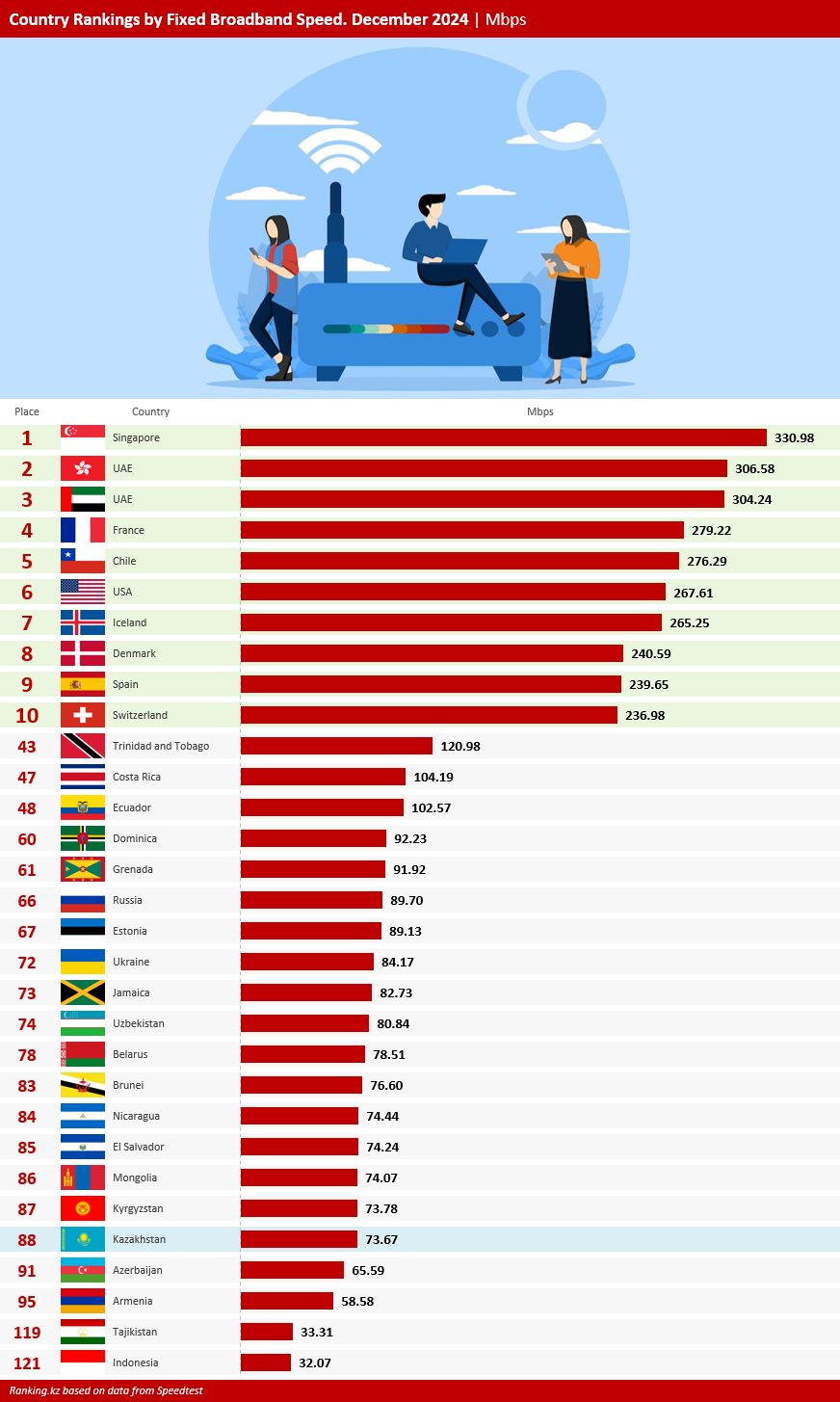As of December 2024, Kazakhstan ranked 88th globally in fixed internet speed, with a performance of 73.67 Mbps, moving up one position compared to the previous month. However, this result remains alarmingly poor. Counting from the bottom, Kazakhstan is among the 35 countries worldwide with the slowest fixed internet speeds.
That's not all. Kazakhstan lags behind not only developed countries but also states with significantly weaker economies. Additionally, the country trails behind many CIS countries, including its neighbors. For instance, Russia (66th), Ukraine* (72nd), Uzbekistan (74th), Belarus (78th), Mongolia (86th), and Kyrgyzstan (87th) all rank higher.
Kazakhstan is also surpassed by countries such as Ecuador, Grenada, Jamaica, Brunei, Nicaragua, El Salvador, among others.
Meanwhile, the top ten countries with the fastest fixed internet speeds include Singapore, Hong Kong, UAE, France, Chile, the USA, Iceland, Denmark, Spain, and Switzerland.
* Ukraine’s status within the CIS remains disputed for several reasons.

The largest player in Kazakhstan's fixed internet market is the national company JSC Kazakhtelecom. The company held a 64.5% market share as of the end of 2023, meaning its performance directly influences market development.
Last year, the company experienced a decline across several financial indicators. For example, Kazakhtelecom’s net profit for the first nine months of 2024 totaled 51.8 billion KZT—a 43.1% decrease compared to the same period in 2023 (91 billion KZT). Despite this, the company's assets are growing (up 1.7% year-on-year), indicating that the company's scale is expanding while its profitability is sharply declining, suggesting reduced operational efficiency.
This trend is also reflected in the dynamics of its profitability ratios: return on assets (ROA) and return on equity (ROE). ROA fell from 6.1% in 2023 to 3.4% for January–September 2024, while ROE decreased from 11.3% to 6.2%.
Weak market development and low internet speed indicators highlight insufficient investment in the sector. The telecommunications industry requires substantial and consistent investments. Yet, Kazakhtelecom, as the largest operator, has significantly reduced capital expenditures: investments in fixed assets declined by 20.3%, from 180.7 billion to 144 billion KZT in the first nine months of 2024. Investments in intangible assets plummeted dramatically by 90.1%, from 161.7 billion to just 16 billion KZT.
Moreover, on January 31 of this year, rating agency S&P Global Ratings downgraded Kazakhtelecom’s credit rating from BB+ to BB, and its national scale rating from kzAA to kzA+. The outlook remains "Negative." This downgrade follows the sale of Mobile Telecom-Service, the mobile operator behind brands Tele2 and Altel. The agency explained its action: "We anticipate a revenue drop of approximately 20% and an EBITDA reduction of about 50% in 2025, decreasing adjusted EBITDA margins from 44% to 27%-28%. This is notably low compared to margins of many European telecom operators or operators with similar business profiles. It reflects Kazakhtelecom’s relatively high-cost structure and significant investment needs."
Thus, Kazakhtelecom faces significant financial and operational challenges. Declining profits, weakening profitability, reduced investments, and a downgraded credit rating indicate the company's weakening position and the slowing development of Kazakhstan’s telecom sector.



